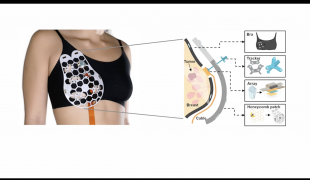- 7918
- 496
- 12
- 8
- 0
- Help Ukraine
About the solution
BiliScreen is designed to be an easy to use, non invasive tool that could help determine whether someone ought to consult a doctor for further testing. Beyond diagnosis, this application could also potentially ease the burden on patients with pancreatic cancer who require frequent bilirubin monitoring.
Dr Jim Taylor, is a professor in the UW Medicine Department of Pediatrics and is one of the team members whose father died of pancreatic cancer at age 70.
BiliScreen uses a smartphone camera, computer vision algorithms and machine learning tools to detect increased bilirubin levels in a person’s sclera, or the white part of the eye.
“Our goal is to have more people who are unfortunate enough to get pancreatic cancer to be fortunate enough to catch it in time to have surgery that gives them a better chance of survival”, said co-author Dr. Jim Taylor.
The team developed a computer vision system to automatically and effectively isolate the white parts of the eye, which is a valuable tool for medical diagnostics. The app then calculates the color information from the sclera, based on the wavelengths of light that are being reflected and absorbed, and correlates it with bilirubin levels using machine learning algorithms.
The ability to detect signs of jaundice when bilirubin levels are minimally elevated (but before they’re visible to the naked eye), could enable an entirely new screening program for at-risk individuals.
In an initial clinical study of 70 people, the BiliScreen app used in conjunction with a 3D printed box that controls the eye’s exposure to light, correctly identified cases of concern 89.7% of the time, compared to the blood test currently used.
“The problem with pancreatic cancer is that by the time you’re symptomatic, it’s frequently too late, (...) The hope is that if people can do this simple test once a month some might catch the disease early enough to undergo treatment that could save their lives.”, said lead author Alex Mariakakis, a doctoral student at the Paul G. Allen School of Computer Science & Engineering.
Next steps for the research team include testing the app on a wider range of people at risk for jaundice and underlying conditions, as well as continuing to make usability improvements, including removing the need for accessories like the box and glasses.
Adapted from:
http://bit.ly/2wMmBq1
http://bit.ly/2vDIgiq
More info:
http://bit.ly/2wXXkvP
This solution shall not include mention to the use of drugs, chemicals or biologicals (including food); invasive devices; offensive, commercial or inherently dangerous content. This solution was not medically validated. Proceed with caution! If you have any doubts, please consult with a health professional.
DISCLAIMER: This story was written by someone who is not the author of the solution, therefore please be advised that, although it was written with the utmost respect for the innovation and the innovator, there can be some incorrect statements. If you find any errors please contact the patient Innovation team via info@patient-innovation.com
-
-
332
-
0
-
3792

Canan Dagdeviren creates a wearable ultrasound scanner could detect breast cancer earlier.
CAREGIVING
Breast Cancer
AI algorithm
3d Printed
Body-Worn solutions (Clothing, accessories, shoes, sensors...)
Promoting self-management
To implement a diagnostic tool
To improve Treatment/Therapy
Preventing (Vaccination, Protection, Falls, Research/Mapping)
Raise awareness
General and Family Medicine
Gynecology and Obstetrics
Medical Oncology
United States
-
-
-
553
-
0
-
8187

Father develops app to help detect eye cancer
Take photos
CAREGIVING
Blindness
Visual Impairment
Ocular Disorders
Cancer
Retinopathy
App (Including when connected with wearable)
Treatment/Surgical device
Vision problems
Preserving Organ Function
To implement a diagnostic tool
To improve Treatment/Therapy
General and Family Medicine
Neurology
Ophthalmology
Pediatrics
United States
-
-
-
319
-
0
-
3230

Ukrainian war refugee couple, one of them a cancer patient, creates an app- AdvIsory.Doctor- for refugees to securely store, interpret, and share medical records.
CAREGIVING
COMMUNICATION: Communicating, whether by speaking, listening, or other means
Traveling
Cancer
Website
App (Including when connected with wearable)
AI algorithm
Enhancing health literacy
Promoting self-management
Manage Medication
Building Supportive Community Relationships
Promoting inclusivity and social integration
To improve Treatment/Therapy
Preventing (Vaccination, Protection, Falls, Research/Mapping)
Raise awareness
Caregiving Support
General and Family Medicine
Medical Oncology
Germany
-
 en
en